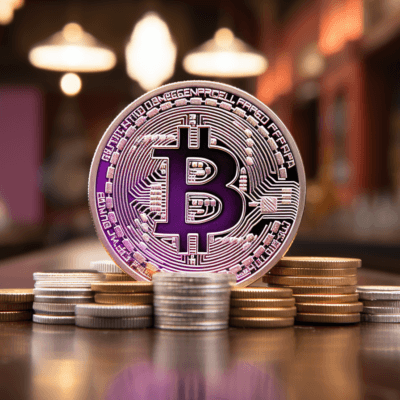
I’m an affiliate marketer by trade. Affiliate marketing is what I’ve been doing for more than ten years to support myself and my family. It’s a great way to make income because you can work from home, set your own schedule, and make more than many jobs that require a higher level of college education. As a bitcoiner, I wanted to find out if there were any affiliate programs that pay in bitcoin, and the results were not that surprising.
There are some options out there, but there are actually very few affiliate programs or affiliate networks paying bitcoin to affiliates. Even bitcoin companies often pay out in fiat.
That’s just the nature of most businesses at this point. Remember that you can always earn bitcoin by simply converting your affiliate payouts into bitcoin. You can even retain bitcoin on your affiliate business balance sheet in addition to stacking personal bitcoin!
These affiliate programs that pay in bitcoin are a great start, but don’t limit yourself based on method of payout.
I haven’t personally tried every single company or product on this list. These are just companies that I would consider to be generally higher quality companies that offer to pay affiliates in bitcoin. Beyond that, you’ll need to continue to do your own due diligence.
I’ve specifically excluded a few things from this list.
- gambling
- cloud mining
- altcoin products*
*the exception here is that I included a few shitcoin exchanges just because they are generally thought of as good quality exchanges, and they do offer bitcoin in addition to a huge list of altcoins.
Companies With Bitcoin Payout Options For Affiliates
Hardware Wallets (Signing Devices)
For holding your own keys, a hardware wallet is a must-have for most bitcoiners. Anyone who owns a significant amount of bitcoin will own at least one, considering you’ll need two or three of them in a multisig situation.
I recommend testing any bitcoin wallets you recommend yourself and just being honest about what your opinions are. There are many opinionated individuals out there who will go hard for or against certain wallets.
If you like a wallet not listed here, you can still email the company and see if you can work out a deal for promoting them. Many bitcoin companies are still quite small and would be open to ideas for getting their products in front of more eyeballs.
Bitbox is the only bitcoin-only wallet that I could find with an affiliate program. Their product is the Bitbox, and although they offer a multi-coin version, you can install bitcoin-only firmware.
Trezor is a very popular wallet, and one that I personally use and recommend to friends and family. It’s very newbie friendly. They don’t offer bitcoin-only firmware, which is a bummer. I like their desktop software Trezor Suite. I recommend you spend extra to get the Trezor T rather than the Trezor One AND possibly use a passphrase if you’re securing a large amount of bitcoin. There’s a known (albeit advanced and unlikely) physical attack vector on the Trezor.
Ledger is extremely popular, but I don’t know why. I found their software to be clunky, and the design of their product ugly. Still, it’s one of the more popular crypto wallets out there, so it could be considered for your affiliate promotions.
Related Content
Bitcoin Exchanges, Marketplaces, And Lenders
Promoting bitcoin exchanges can be very lucrative because you often get a flat fee for each signup, plus an ongoing percentage based on how much bitcoin they buy or how many trades they execute. Passive income is an extremely attractive proposition, and if you successfully orange pill your referrals, that could mean consistent income as they DCA into a bitcoin.
I tried to find bitcoin-only exchanges, but there aren’t that many bitcoin-only exchanges to start with, even fewer with referral programs, and even fewer that pay in bitcoin.
Swan Bitcoin is probably the best bitcoin-purchasing service and they seem committed to their referral program, so this is one to focus on in my opinion. You get a flat fee in BTC for each signup, then a recurrent percentage of their purchase fees for the first year of their account.
HodlHodl is another trading platform that uses multisig to allow users to trade funds rather than escrow, so your bitcoin is never held by a centralized entity. There are lots of payment options, including Amazon gift cards, VISA gift cards, Lightning, Payoneer, and altcoins.
HodlHodl will reduce your own trading fee, in addition to paying you a percentage of the fees of your referrals, though they don’t actually say what that percentage is. Better check that to make sure.
Crypto Swapping
Simple Swap & Changelly are both crypto swapping services that pay out in bitcoin based on a percentage of trading fees. Changelly pays up to 50% revenue share but I’m a bit confused about how “revenue share” is counted, since Simple Swap claims to pay just 0.4% revenue share. Perhaps they mean 40% (0.4 = 40%) rev share, or we’re talking about different numbers here, i.e. value traded vs escrow fees. Anyway, this is unclear, so double check it.
What is clear is that Simple Swap seems to have a pretty nice affiliate program in that they have proper tracking and other tools to help you grow your income.
As mentioned above, I don’t mean to recommend altcoins to anyone, but in my experience, these services are useful for getting out of altcoins in a hurry if you don’t have an exchange account or your exchange doesn’t list the coins you want to sell (I used this to sell my ETC for bitcoin a few years back).
Online Advertising
CrakRevenue is an adult-focused affiliate network that caters to categories like adult websites, sexual health (dildos, boner pills), CBD oil, and that type of stuff. While I, myself would never buy that shit, it’s an absolutely massive category in affiliate marketing and insanely profitable if you can tap into the right audience.
A-Ads is a cryptocurrency-focused ad network. Ad networks allow publishers (like blogs or news sites) to run code that automatically generates ads from advertisers. The ad network is responsible for matching publishers and advertisers. Publishers get paid per view, click, or sale. Advertisers get their products in front of more viewers. The ad network provides a valuable service.
As someone who’s been in blogging for a decade, I know that some ad networks are picky about what type of sites they integrate into their network, and bitcoin can be one of those ones where they’re like, “Nah, not interested.” mostly because of the reputation for financial speculation (i.e. gambling).
Crypto Ad Networks
It makes sense that crypto ad networks would start to develop, so that crypto publishers can more easily work with crypto advertisers. Better matching an audience to ads means higher conversions (more money!) and a better user experience for the reader.
BitMedia.io is a similar company, in that it’s a crypto advertising network. When you refer advertisers, you earn a percentage of their advertising fees based on whether they are a new or established entity, and how many referrals you stack up. More referrals mean a higher percentage, up to 15%.
For referring publishers, you get paid based on the page views and the type of website. Higher page views pay better, and review blogs pay better than news sites or communities.
Shitcoin Casinos
I personally try not to promote shitcoin casinos myself, but there may be some instances where it makes sense for your audience. For example, there may not be a bitcoin-only company available in the country you promote, or they may offer a specific product your audience is looking for. The unfortunate thing about these companies is that they often pay affiliates based on trading fees, which means you have the incentive to encourage your audience to trade shitcoins.
For example, you may want to get people to sign up for the Gemini credit card to earn bitcoin rewards, but they may not pay out based on credit card signups – only on trading fees. I don’t know that for a fact, but it’s just an example of how you may be incentivized to promote certain things to your audience.
I’ll leave the product promotion and ultimate decision up to you though. I’m just listing the affiliate programs that pay out in bitcoin that I could find.
Software
This is more of a running list since I couldn’t find anything significant during my initial research.
Hosting & Domains
I have no idea if Bitcoin Web Hosting is quality hosting, but it seems pretty interesting. I’d also research specific hosts you like because there are bitcoin options out there. I used to promote some hosts and remember seeing options, though this was several years ago.
Same thing with BitDomain. This isn’t a domain registrar that I’d personally use, but maybe they’re worth checking out.
VPNs
Virtual Private Networks are another type of software worth looking into if you want to get paid in bitcoin. There are more than a few that accept bitcoin from customers, so it’s possible that you could work out a deal to get paid in bitcoin. Though I can’t vouch for the VPNs themselves, two VPNs that accept bitcoin for payment AND have affiliate programs are:
- NordVPN
- PureVPN
There are many more VPNs that take bitcoin, but don’t have affiliate programs, or have affiliate programs, but don’t accept bitcoin. You’ll have to do your research here and find out what works for you.
Education

The Saifedean.com affiliate program is a brand new one, but Saif is a long-time bitcoiner and educator in the space, so I’d like to include it in the list. I love that he’s opted to pay affiliates in sats.
With Saifedean’s site you get educational courses, webinars, and livestreams on the topic of Austrian economics, fiat money, bitcoin, and other money-related topics. I’m not a member, so I can’t speak to the specifics, but I do listen to his podcast, and it’s interesting to hear his students chime in with live questions. If you want to help people learn about this type of stuff, you can’t beat Saif’s straightforward, no-nonsense, educational material.
To become an affiliate, I recommend emailing Saifedean directly from his contact form. I have a link to the registration form but it’s from my email and the exact link may change eventually has he adds an application form on the website.
The #1 Problem To Watch Out For
I’ve attempted to promote some affiliate programs purporting to pay out bitcoin with some of my other blog projects and do have a few pieces of advice in terms of problems to watch out for.
The #1 issue with many of these programs is that they offer bitcoin as a payment option only on a trial basis, and there’s no guarantee that they will continue it into the future. We saw this happen when Steam stopped offering bitcoin payments as an option when fees got too high, and Wikipedia stopped taking bitcoin donations because of energy FUD.
If getting paid in bitcoin is super important to you, then it would be worth your time to do a bit of research into the affiliate programs you plan to promote, including sending an email to their affiliate manager.
Two good examples of what to look for are Swan Bitcoin and Trezor. I don’t mean this as a specific endorsement of those companies, just as a general idea of what would be a good quality of an affiliate program that pays in bitcoin.
For example, Trezor has been around for many years and has paid affiliates in bitcoin for many years. They aren’t likely going away any time soon. Swan Bitcoin is a newer company, but they are hyper focused on bitcoin, so as long as they are around, they’ll likely continue to offer the option for affiliates to get paid in bitcoin.
There are many companies out there who would easily rugpull you, declaring bitcoin an environmental issue, or whatever other FUD is in the news, and cancel their bitcoin payout option.
So, my advice is to see how long the company has been around, how long they’ve been running their affiliate program, and how long they’ve been paying in bitcoin.
Is It Ethical To Promote Affiliate Programs?
A lot of bitcoiners hate affiliate links (AKA “ref links”, short for “referral links”), and with good reason. The cryptocurrency space is full of scams. One of the worst types of grifts is what’s known as an affinity scam, where someone assimilates into your group, first appearing as an ally and friend, then uses the goodwill bestowed upon them by the group to later benefit financially from those that trust this person.
It’s a way to gain influencer trust, then abuse that trust for financial benefit.
It’s happened many times before, where someone becomes a prominent bitcoin “thought leader” or influencer, then suddenly shifts gears to promote an altcoin. I like bitcoin, so buy my shitcoin!
The same happens with affiliate links in the space, where someone will spend a significant amount of time growing an audience, then start shilling a company without doing proper due diligence, getting their audience rekt in the process.
This has led a lot of people in the bitcoin space to take a pure no ref link stance. You should only recommend something if you use it and should gain no financial benefit from recommending it.
While I understand this position, it’s not how I view the situation.
Getting Paid To Do Important Work (Just Do It Right)
I see content creation as a type of work that needs to be done, and affiliate marketing is a way to monetize that effort. Done with proper disclosures, there’s no reason you shouldn’t get paid for the work you do.
Look, some of these articles I publish take hours to research, write, edit, and market. It’s nice to publish things for free, but at the end of the day, everyone wants to get paid for providing value. A core tenant of living on a hard money is the only way to get money from another individual is through voluntary interaction. Value for value. Money for work. In the digital world, content creation, whether written, visual, or audio all takes work, and creators want to get paid.
There are many monetization models, and although affiliate marketing may be out of favor for whatever reason, it’s not all that different from other forms of marketing. When you listen to a podcast and they run ads, how is that so different from placing an affiliate link in your content? When you place Adsense ads on your blog and a sticky sidebar ad recommends a company, how is it that different from placing an affiliate link in the same place?
The principle is the same. Creators front-load the work, publish content for free, then get paid based on views, click-throughs, and conversion rates. Good content gets elevated and converts, low quality content pays them nothing.
So is it ethical to promote affiliate programs? I don’t see an issue with it. As long as your audience knows what’s an affiliate link and what isn’t then I think it’s totally fine. Focus on creating value for your audience, and do your best to monetize your work in a way that feels comfortable for you.
The Benefits Of Affiliate Marketing As A Business
Work Anywhere, Promote Anything
You can do affiliate marketing for any type of product, from kitchen tools to camping gear, or digital info products and software downloads. There are tens of thousands of affiliate programs available in every category imaginable. There is no best affiliate program to promote. You just have to promote the right product to the right audience to make money.
Some affiliates make multiple six-figure income promoting digital downloads or software subscriptions. Other affiliates promote physical products.
You can choose to promote a top choice product, i.e. “best in category”, or you can promote a wide variety of things on your site. It really depends on what you’re promoting and how you choose to promote it.
Some affiliate marketers travel the world while they run their affiliate sites. You have no inventory, no shipping, and no returns. Your business is driving traffic. They take care of the rest.
Even so, many just live very normal lives running an extremely versatile online business of which they control every aspect.
It’s A Simple, Fun Business To Run
It’s possible to run a full-time, 6-figure affiliate business with zero employees. You get to choose the product and method of promotion on your website.
Affiliate marketing gives you a lot of creative control over how you spend your time during the day. Not just work vs home life, but also in terms of what you actually work on. You can grind out articles with personal insight every day, or you can pay someone to do the writing while you focus on social media engagement.
Once you’re profitable, pretty much everything can be outsourced and you can think about bigger picture things like growth strategies.
Providing Value To Businesses And Consumers
Done correctly, it’s a win-win-win situation. Companies get to hire no-contract freelance advertisers and only pay based on performance. Affiliates earn income promoting quality products they personally recommend through channels they own and design themselves. Customers get to learn about products through language and media customized to them, rather than traditional corporate advertising.
The company sells a product. The consumer is happy with their purchase. You get paid. Everyone wins.
Final Thoughts
There aren’t a ton of options for affiliates to get paid in bitcoin right now, but there certainly are more options than a few years ago. What’s also noticeable is that the quality of affiliate programs has improved in the meantime as well, at least, in my opinion.
Getting paid in bitcoin is still rare, but it’s less fringe than in the past, and I suspect that more companies may start to offer this as an option, especially as international affiliates start seeing the advantages of getting paid in bitcoin over the traditional banking system.
Expansion of this type of offering is going to be spurred by demand though, so if you are promoting a product currently and are successful at it, start talking to your affiliate manager about adding a bitcoin option. Plus, you never know who you can orange pill in the meantime!
Frequently Asked Questions
What Is The Highest Paying Bitcoin Affiliate Program?
The highest paying bitcoin affiliate program is Binance, which pays 50% commission on trading fees, fees on futures trades, a signup bonus, and up to $72,000 on futures trading referrals. They don’t pay out in bitcoin, but you can easily trade your earnings for bitcoin using their platform.
Does Coinbase Have An Affiliate Program?
Yes, Coinbase has an affiliate program. They pay 50% commission on trading fees, but they pay out in dollars, not bitcoin.
Does Binance Have An Affiliate Program?
Yes, Binance has an affiliate program. It’s extremely popular because Binance is a global company with a very lucrative affiliate program. However, consider that as an affiliate of Binance, your incentive is to encourage your referrals to engage in risky trading activity such as trading altcoins and placing bets on futures markets.
Are There Any Bitcoin Mining Affiliate Programs?
There are no bitcoin mining affiliate programs, but the bitcoin exchange River.com has a referral program and they offer hosted mining services. With mining products and services you may still be able to earn commissions in bitcoin through finders fees and similar private agreements, so if you have leads, don’t hesitate to contact mining companies. Lastly, beware of cloud mining scams!
What Is The Highest Income You Can Earn As An Affiliate?
There is no limit to what you can earn as an affiliate because affiliate businesses scale very well. Some affiliates do it as a side hustle and still keep a 9-to-5 job, while others go full time and earn $100,000 up to multiple millions of dollars per year from affiliate income.


















 Is Bitcoin Going To Zero?
Is Bitcoin Going To Zero?
Leave a Reply